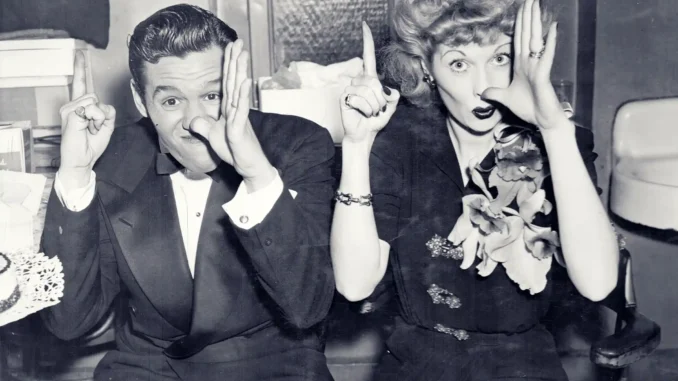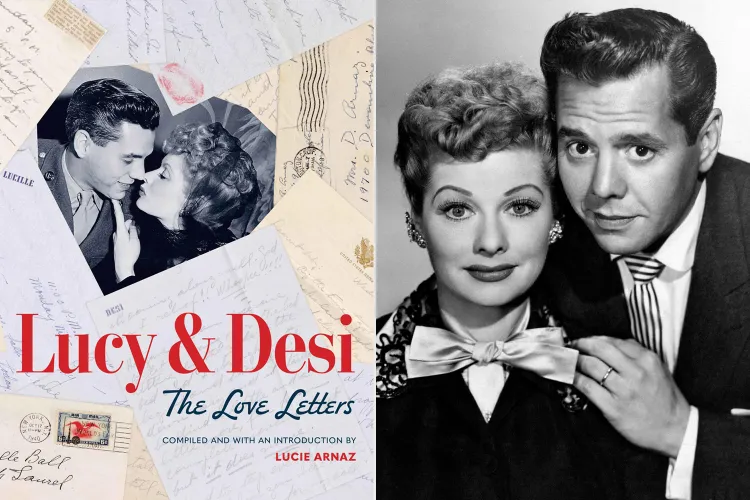
In the glittering world of old Hollywood, few couples captured the public’s imagination quite like Lucille Ball and Desi Arnaz. Together, they created I Love Lucy, one of television’s most beloved and groundbreaking shows — a comedy that redefined how America saw marriage, humor, and ambition.
But behind the laughter, behind Lucy’s slapstick brilliance and Ricky’s charm, there existed a love story steeped in passion, misunderstanding, and heartbreak. And now, through a series of recently rediscovered personal letters, fans are getting a rare glimpse into how the couple’s private emotions bled into their public lives — revealing a bond that was as painful as it was profound.
Love at First Fight: A Romance Born in Chaos
Lucille Ball met Desi Arnaz in 1940 on the set of Too Many Girls, and the connection was instant. She was a fiery New Yorker on the rise; he was a Cuban-born bandleader with charisma that could light up a room. Within six months, they were married — a whirlwind union that would soon become both the foundation and the undoing of their lives.
Their chemistry, both on and off screen, was electric. But it was also combustible. Desi’s touring schedule, coupled with Hollywood pressures and tabloid scrutiny, tested their relationship constantly. Yet even in their worst arguments, the letters they wrote to one another reflected a kind of tragic devotion.
In one letter, Lucille confessed:
“You make me laugh when I want to cry, and you make me cry when I should laugh. How do we ever find peace in that?”
That question would haunt them for the rest of their marriage.
Writing Through the Storm
At a time when celebrity relationships were carefully curated for the public eye, Lucy and Desi’s private correspondence showed raw honesty. These weren’t love letters meant for the press — they were confessions written between two people trying to make sense of a relationship that defied balance.
Desi often wrote from the road, where he toured with his orchestra, confessing his loneliness and regret for the arguments that followed him out the door. In one particularly poignant note from 1951, he wrote:
“I’m playing for thousands tonight, but the only applause I want is yours.”
Lucille, for her part, wrote of longing and fatigue — not just from their marriage, but from the dual life they led as co-stars on I Love Lucy. Their show was a massive success, but it came at a personal cost.
As one of her letters reads:
“Everyone laughs when we’re on screen. But no one sees the silence when we drive home.”
It’s a sentence that feels more like a wound than a line of prose.
When Fiction Became Too Real
What makes the rediscovered letters so moving is how they mirror the emotional beats of I Love Lucy itself. The sitcom, known for its humor and mischief, often revolved around Lucy’s schemes to win Ricky’s attention — usually ending in chaos, then reconciliation.
Off-screen, life wasn’t so different. Lucy often described herself as “chasing” Desi, not for love but for connection. The demands of their production company, Desilu Productions, left little room for rest. The irony was cruel: while the world laughed at their onscreen antics, the couple themselves were falling apart from exhaustion.
A 1954 letter from Lucy to Desi reads:
“You are every song in my heart, but I can’t hear the music anymore.”
Not long after that, the music stopped completely. Their marriage dissolved in 1960, after two decades of shared brilliance and private sorrow.
After the Break: A Love That Never Left
Even after the divorce, Lucy and Desi’s bond didn’t vanish — it transformed. They remained collaborators, co-parents, and in many ways, emotional partners long after their romantic relationship ended. Their children, Lucie Arnaz and Desi Arnaz Jr., later described their parents’ relationship as “imperfect but unbreakable.”
Desi once wrote, years after the divorce:
“We were never right for each other, but we were never right without each other.”
And when Lucille Ball received her Kennedy Center Honor in 1986, it was Desi who sent her a heartfelt note, unable to attend due to illness. His words were simple yet devastatingly tender:
“I Love Lucy was never just a title.”
He passed away a year later, and Lucille reportedly wept when she read the letter aloud.
Pain on Paper: What the Letters Reveal About Love
What makes these rediscovered letters so timeless isn’t just the celebrity behind them — it’s their vulnerability. They show that even in the golden age of Hollywood glamour, love was messy, imperfect, and often unfixable.
Lucille Ball wasn’t the zany redhead audiences adored. She was a woman torn between ambition and affection, constantly trying to reconcile her success with her personal loneliness. Desi Arnaz wasn’t just the charming bandleader — he was a man burdened by insecurity, struggling to live up to the image the world projected onto him.
Together, their letters read like a duet — two voices in harmony and dissonance, confessing truths too painful to speak aloud.
As one of Desi’s final notes to Lucille reads:
“No matter what the world says, we did something beautiful. We made them laugh. And we loved each other the best we could.”
Legacy of a Complicated Love
More than sixty years later, the story of Lucille Ball and Desi Arnaz still captivates audiences. Their lives have inspired books, documentaries, and films — from Being the Ricardos to the Lucy and Desi documentary produced by Amy Poehler. Yet no dramatization captures the raw humanity found in their own words.
These letters, filled with longing, regret, and grace, are more than artifacts — they’re evidence of how love endures even when it fails. They remind us that behind every great partnership lies a story of compromise, sacrifice, and, sometimes, heartbreak.
Lucille once said in an interview near the end of her life:
“Desi and I went through everything — joy, jealousy, triumph, and tears. But if I had to do it all again, I’d still choose him first.”
It’s hard not to feel the ache in that admission — the kind of love that doesn’t fade, only changes shape.
Final Reflection
The lost letters between Lucille Ball and Desi Arnaz do more than expose the cracks in a Hollywood marriage — they reveal the very soul of what it means to love and lose in public.
Their story isn’t one of tragedy, but of truth. It’s the story of two people who built a legacy of laughter out of their pain — and who, even in separation, never truly let go of each other.
For decades, they taught America how to laugh. Now, through their words, they’re teaching us something even deeper — how to remember, forgive, and love despite the breaking.
